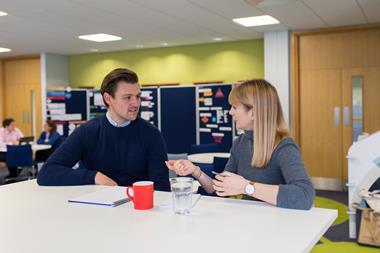Taking part in a mentoring programme can provide you with the support you need for career success

Deciding to work with a mentor can be one of the most impactful decisions of your career, so it’s important to consider the type of person you’d like to work with. A mentor is there to support and guide you, as well as providing insights. They can often be a catalyst that encourages you to explore the next step in your career.
Whether you are a student about to enter the world of work, or more established in your career and looking to make a change, choosing the right mentor is key. A good way to find a mentor is to join a mentoring programme.
Define your mentoring needs
Before you start your search it’s important to understand what your goals are. Are you looking for guidance on people management skills, career progression or perhaps on work–life balance? As a PhD student you might seek advice on research publications or grant writing, while someone in industry might focus on their networking or leadership skills. Defining what you hope to gain from mentoring will help you identify the right person.
Take the time to consider:
- What are my short- and long-term career goals?
- What specific skills or knowledge do I want or need to develop?
- What scenarios am I looking to navigate?
Any good mentoring programme will include training that can help you to develop your goals. It will cover also topics such as establishing the rules of your relationship, practical things to consider such as frequency of meetings, and guidance on how to stay motivated.
Finding a mentor
Your employer may offer a mentoring programme or you may wish to look to your wider professional circles. Effective mentoring relationships begin with a matching process designed to pair mentors and mentees based on complementary skills, experiences and learning objectives. Typically, both mentors and mentees complete a questionnaire asking about their experiences and skills, or mentees might share the areas that they’d like to work on.
Some schemes may manually match you with a mentor. Others allow you to search and review potential mentors yourself. It’s unlikely that a mentor will have everything you are looking for in terms of skills or background so be open to any match. You don’t have to accept a match, or you may find you need an initial discussion to establish if you can work together.
Make sure you clearly define the nature of your relationship
Mentors are there to provide you with time and space to reflect, explore your options and provide momentum to keep you moving forward, so specific background or experience doesn’t always need to be the most important factor. You may not get everything from just one mentor and may choose to work with different mentors to meet differing needs.
When reaching out to a prospective mentor do highlight what has drawn you particularly to them, perhaps it is the field they work in, or a specific skill they can offer you. Include what you are looking to achieve from being mentored as well.
Once the mentor has accepted your request it’s important to ensure that the relationship gets off to the best start it can, so between you make sure you clearly define the nature of your relationship, including preferred communication methods, meeting frequency and boundaries. Remember the mentor is there to guide you and not make decisions for you.
Best practices for a productive mentoring relationship
Check that you have completed mentee training before you meet with your mentor as it will help ensure you have a successful partnership. Some top tips for mentees include:
- Prepare for each meeting – come ready with specific questions or topics you want to discuss
- Set clear and measurable goals – work with your mentor to outline milestones you want to reach
- Be respectful of their time – be punctual and come prepared to maximise your time together
- Embrace feedback – constructive criticism is a crucial part of growth
Show appreciation for the mentor’s guidance by sharing your progress, asking for advice on critical decisions and when possible, offer support in return. As you grow together, your relationship may evolve from mentorship to a genuine professional partnership, or even friendship.
In some instances mentoring partnerships don’t progress in the way you hoped. A partnership that isn’t the right fit isn’t a sign of failure. Reflect on what you’ve learned, recognise that it’s time to bring the formal relationship to a close – and use this experience to guide your search for your next mentor.
Finding the right mentor can transform your career, whatever career stage you’re currently at. Being clear about what you want to achieve will help you identify the right mentor for you and can have a lasting impact on your professional journey.
Mentoring support from the RSC
The RSC’s general mentoring programme is open to Associate members (AMRSC), Members (MRSC), Fellows (FRSC), Registered Science Technicians (RSciTech) and Registered Scientists (RSci).
You can access more information and register for the platform at rsc.li/mentoring
Mentoring support from the RSC
The Royal Society of Chemistry’s general mentoring programme is open to Associate members (AMRSC), Members (MRSC), Fellows (FRSC), Registered Science Technicians (RSciTech) and Registered Scientists (RSci).
All participants must complete a short questionnaire which enables you to highlight the skills or areas you are looking to develop. Once registered you’ll be able to explore the profiles of the available mentors. You can use filters to search against your main needs, or you can ask the platform to recommend best matches.
The RSC uses the Mentorloop platform with training available from your homepage. It also provides extensive ‘how tos’ on topics such as asking the right questions and setting incremental challenges to achieve your goals.
If you are interested in becoming a mentor, you will need to be a Member or Fellow of the RSC.
You can access more information and register for the platform at rsc.li/mentoring












No comments yet